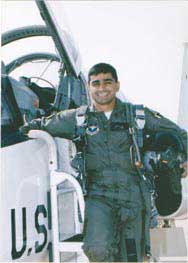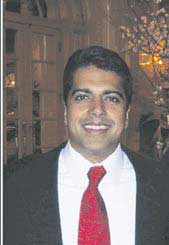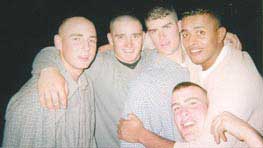Magazine
Unconventional Uniform

Indians in the United States armed forces.
|
A C-17 pilot and a captain in the United States Air Force, Ravi Chaudhary had one critical mission to complete before heading off to serve alongside U.S. forces in Iraq. With the threat of imminent deployment looming large, Captain Chaudhary worked painstakingly to put together an “emergency kit” for his two-year-old son Krishan.
The kit comprises video tapes of Ravi Chaudhary reading bedtime stories to his son, singing his favorite songs and talking to him. “It’s one way he can spend time with Krishan,” explains Ravi’s wife Uma. “Krishan understands that Ravi is gone. Unfortunately his whole life has been like this. But at bed time when he watches his dad read Goodnight Moon and Very Hungry Caterpillar it really helps.” Captain Chaudhary is one of a growing group of Indian Americans drawn to careers in the Armed Forces. Over the years, a number of young Indian Americans have been breaking the mould and opting for careers outside medicine, engineering, finance and even information and technology, professions that many Indian parents actively encourage their children to pursue. Captain Varun Puri’s parents didn’t know what to make of their son’s decision to join the U.S. Air Force. “My parents do not come from a military background,” explains Captain Puri. His father works in sales while his mother is a substitute teacher. “They were kind of surprised that I was so involved in the Air Force. They didn’t realize that me going to the Air Force Academy would ultimately mean a career flying planes!” The second of three children, Captain Puri got involved with the Air Force in high school. Pursuing his dreams to become an astronaut, he joined the Air Force Academy in Colorado. It wasn’t until he started flying that his parents realized what his career was all about. “After that they turned very supportive of my decision,” he says.
Captain Puri now teaches aspiring pilots how to fly the F-15E – the Air Force’s Strike Eagle – at the Seymour-Johnson Air Force Base in North Carolina. The F-15E Strike Eagle is a dual-role fighter designed to perform air-to-air and air-to-ground missions. An array of avionics and electronics systems gives the F-15E the capability to fight at low altitude, day or night, and in inclement weather and perform its primary function as an air-to-ground attack aircraft. Captain Puri’s passion for flying is matched by First Lieutenant Biren Oberoi’s enthusiasm to be part of the Air Force. A resident of Alpharetta, Georgia, Madhu Oberoi says her son always wanted to join the Air Force and serve the nation. “Our friends are surprised when we tell them Biren is in the Air Force. They often remark that a career in the armed forces is a very unusual profession for a person of Indian descent,” she says laughing at the thought. First Lieutenant Biren Oberoi is a pilot with the Air Force flying KC10s – the Air Force’s hrefueling aircraft. He was commissioned in the Air Force in 2000, soon after graduating as a mechanical engineer from Georgia Tech. The Oberois moved to Georgia from New Delhi, India, 10 years ago. Joining the Air Force was Biren’s way of saying thank you to America for the opportunities this country has given him. “He says he can make a career in the corporate world at any time, but this is something he wants to do right now,” says his mother, adding, “Our family’s motto is that if you can find a job you can love, you don’t have to work for the rest of your life!” Madhu Oberoi says her son’s passion for flying has always been something that has allayed any concerns she may have had about his career choices. “As a family, we were very supportive of him getting ahead. And he knows that and feels very happy about it,” she says. Madhu Oberoi’s acceptance of her son’s career is in stark contrast to Sarada Nair’s initial reaction on learning of her teenage son’s desire to join the Armed Forces. She panicked at the thought of the danger associated with a career in the Armed Forces. “I tried my best to dissuade him (from joining the force),” recalls Sarada Nair, adding, “But there is a limit up to which you can keep your children from doing what they are really passionate about.”
Poor eyesight disqualified Sharad Nair from becoming a fighter pilot, but it did not stop him from promptly signing up with the Marines. After all her initial concerns about her son’s career choice, Sarada Nair now seldom tires of recounting a conversation she had with a colleague at her office in Manhattan. Employed at Tata Inc., Sarada Nair says a friend at work told her one day that most Indians in America were either doctors, engineers or computer professionals. “She informed me that not many Indian American parents could say their kid was a U.S. Marine,” Nair recalls proudly. Unlike most parents, Dr Panavelil Paul could very easily relate to his son Jimmy Paul’s ambition to become a U.S. Marine. As a young man growing up in India, Dr Paul was on the verge of signing up with the Indian Army before a successful attempt in the medical college entrance examination drew him to a career in medicine. “Just like me, Jimmy was keen to join the armed forces. For us it’s just another career. We’re not too anxious about his decision,” says Dr Paul, a resident of Silver Spring, Maryland. Corporal Paul’s mother Thankam, a teacher working in a pre-school program in Gaithersburg, Md, admits she is a little concerned. “He chose his career and I support his decision, but as a mother I am really worried,” she confides, adding, “We go to church every Sunday and pray for Jimmy. These days (during the war in Iraq) I also pray for the other young boys and girls who are out there fighting.” Thankam Paul’s concerns echo those of every parent who has a kid in battle. “It’s the younger people who usually end up going to the front,” says Dr Alex Alexander. “The families left behind go through an unimaginable time.”
Originally working in the medical corps of the U.S. Department of Veterans Affairs, Dr Alexander volunteered as a reserve medical officer in the U.S. Military at a time it was short of doctors. He completed two tours of duty, one in Germany in 1989, and the second during Operation Desert Storm when he worked at Walter Reid Army Medical Center in Washington. Dr Alexander retired after completing 20 years of reserve-cum-active duty. While parents agonize every time their kid is called to duty, armed forces spouses face no less of an emotional roller coaster. The daughter of a professor at Ohio University, Uma Chaudhary has been married to Captain Ravi Chaudhary for six and a half years. “You would have thought I’d marry a doctor like everybody else,” jokes this vivacious young woman. Then in a more serious vein she adds, “Things have gotten much worse in the last couple of months (since the war). He’s away all the time.” A C-17 pilot, Captain Chaudhary is familiar with the strain his career puts on his family. “Uma is a true American patriot, and like so many other military spouses knew that carrying our family forward would fall upon her … alone at times,” he says knowingly. Currently based “somewhere in the Middle East,” Captain Chaudhary is full of stories about his experiences in Operation Iraqi Freedom. Recounting one incident he says: “I remember landing at a forward operating base just hours after President Bush’s 48-hour deadline had passed. Our whole crew was asking our maintenance folks whether or not the war had started yet. Nothing new had developed so I stepped off the aircraft to file our return flight plan. Suddenly things got busy around the aircraft and I asked our ground maintenance what was going on. Apparently the war had started and Iraqi missiles were reported fired at Kuwait. Let’s just say that suddenly our number one priority was to start the engines and get our aircraft off the ground!”
Captain Chaudhary admits that the long-drawn out debate in the United Nations Security Council and anti-war protests in the U.S. and around the world did affect his morale, when he had time to think about morale, that is! “As airlifters, we’ve been in high gear for the past four months. But when I did think about the lengthy debate and protests, it filled me with pride in the democratic system, and strengthened my resolve to attain a high level of mission readiness, should the call come to execute. Isn’t this what we are here for? There’s a reason this operation was named Iraqi Freedom,” he says. A year of working as an airlifter in the Afghanistan area taught Captain Chaudhary to always expect the unexpected. “Every day held something new, some additional challenge. But you learn to adapt as a team and get the goods to the fight.” Operation Iraqi Freedom has not been much different. As an airlifter, Captain Chaudhary has spent a period of time in required crew rest. “Then we typically are alerted and perform flying duties, and return from our mission. Overall it’s about a 24-hour duty day, then we re-enter crew rest, get some sleep, and start the sequence all over again! The days can be quite long, and you learn to appreciate your crew rest period,” he jokes. Back at home, Uma Chaudhary says, “With Ravi gone all the time I’m the dad and the mom! I’m the husband and the wife!” The delicate nature of his work prevents Captain Chaudhary from disclosing information about future missions to his wife. “We talk about things, but he can’t tell me much,” she says. When asked what prompted him to join the Air Force Captain Chaudhary replies: “For me it’s a pretty simple answer … I can’t really think back to a day when I haven’t wanted to be in the Air Force! I’ve had a burning desire to serve my country since I was a child.” Captain Chaudhary, whose brother Satveer Chaudhary is a Democratic State Senator in Minnesota, has had the “total and unwavering support” from his family. “It was pretty much accepted that my life would have something to do with the aerospace field. However, sending me off to the USAF Academy left a bit of the unknown for all of us to guess,” he says. His senator brother adds, “The main role of the family in times of war is to support each other and make sure that the gap is filled to all possible extents in terms of emotional as well as physical support which makes it even more difficult when you live half way across the country.” At times when his brother is out on a mission Senator Chaudhary makes it a point to visit his sister-in-law and help out with things. “He’s always been there for us,” Uma Chaudhary says appreciatively. For reservists and the troops, deployment can come at any time. “I take everything one day at a time,” says Uma Chaudhary. The young couple tries to make the most of time spent together. “When we sit down and talk we realize our relationship is stronger than other couples who do not have to go through such things. We have a real respect for each other,” she says, adding “We never try to leave angry or upset about anything. I know I don’t want him thinking about family issues while he’s flying his plane.” Spouses of armed forces personnel often form strong support systems. Uma Chaudhary has never met Captain Varun Puri’s wife Priya, but the two often correspond via email giving each other support in times of separation from their husbands. As a flight instructor, Captain Puri hasn’t had the opportunity to see action in Iraq. His last assignment was in England from where he was deployed to cover the no-fly zone over Iraq. “If there are people going, you want to go too. But that doesn’t mean we’re dying to go to war,” he says. “A lot of my friends have been deployed. There was a little bit of a feeling that I’m missing out, because my friends are going down range, but I’m also proud. We have some of the best trained people in the world.” He sees his job as providing a deterrent – “we’d like to see our role as preventing war rather than starting one.” His wife of a few years, Priya worries that her husband might be called up at any time. “Of course you don’t want them to go (into war). But if such a time comes we are mentally prepared for that,” she says. First Lieutenant Oberoi realizes that while his parents may accept his career choices, they will always be concerned for his well-being. During the war in Iraq family members were never given an exact location for their loved ones. “All we’re told is ‘somewhere in the Middle East!’ They are not allowed phone calls, but he does send us an email once a week,” says Ms Oberoi. Her son recently emailed home to let his parents know he was OK. “He knew we were going on a business trip and wanted us to be at ease. That’s the way he is.” Operational mode brings limitations on communication between families. “You can only tell them how you’re doing. The most you can say about your location is, ‘Somewhere in the Gulf,'” says Captain Prakash. His parents learnt of their son’s deployment through television. “It was tough on them. Even my relatives in India were watching the news very carefully,” he says. “When things are in an operational mode, communicating with the family becomes difficult. There is always the danger that notes and emails could be intercepted,” says Prakash, adding that at the time of Operation Desert Storm email was only just becoming popular. Prakash’s mother is a physician, and his father is a retired chemist. “They were very supportive, but also very hesitant. They were not sure what it meant. Their thoughts were immediately about what sort of career I would have!” And while he admits the number of Indians in the armed forces is steadily growing, Prakash says he never ran into any while with the Marines. “There were at least three or four officers in the Marine Corps when I was in active duty. A lot of Indian Americans are now going straight to the Armed Forces after they finish their education,” he says, underscoring a growing interest among Indian Americans to be a part of the force. Captain Puri had the opportunity of getting to know Captain Chaudhary while in boot camp. “Ravi was a role model for me (during boot camp),” says Captain Puri. The two interacted for a year. “There were no other Hindus and Ravi made sure I had an opportunity to practice my religion. He even gifted me a copy of the Gita.” Captain Puri’s experiences in the Air Force have all been positive. “Here you serve your country first. Being a minority is not a disadvantage,” he says, adding he has never seen any racial discrimination on the force. “Obviously (as an Indian) you’re easy to recognize, but for the most part the Air Force has a fairly positive image of Indians. They’ve made a good name for themselves.” |






You must be logged in to post a comment Login